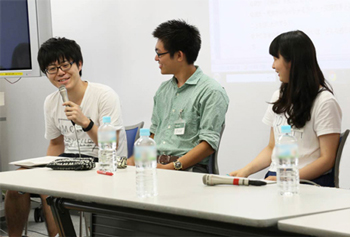Issues Involved with a Low Birth-rate Society: Focusing on the Increasing Unmarried Population--Young People's Views on Relationships with the Opposite Sex, Marriage, and Children
3. Panel discussion: young people's opinions on relationships with the opposite sex, marriage, and children
| Panelists: | Touko Shirakawa | (Journalist, Visiting Professor at Sagami Women's University) |
| Iroha Ogo | (Keio University, member of manma*) | |
| Yu Onoda | (Waseda University, member of manma) | |
| Masamichi Noda | (Waseda University, member of manma) | |
| Facilitator: | Seiko Mochida | (Benesse Educational Research and Development Institute) |
* manma
A project group initiated by female students at the Faculty of Law, Keio University in 2013. The group mainly provides female university students with opportunities to think of life designing, including work, marriage, and childbirth. In order to respond to students who are worried that their only role model is their mother, the group offers the "Family Education" program. Under the program, students will be given opportunities to directly observe working mothers who manage childrearing and work in their daily lives. Currently, 120 university students (including male students) and 100 families have registered with the program.
manma website: http://manma.co/ (Only available in Japanese)
The previous sections have explained the views of young people on relationships with the opposite sex, marriage and children based on the statistical data, as well as the opinions of Professor Toko Shirakawa. This section will introduce young people's voices through a panel discussion.

Life design education
Mochida: Have you ever thought about life designing? What did you think of the lecture given by Professor Shirakawa?
 | Ogo: I went to an all-girls school from elementary school to high school. I have learned about sex in the health education class and about work in the career education class separately. But after hearing Professor Shirakawa's lecture, I came to think that we should consider the two topics as a combined matter. |
| Noda: I totally agree with the value of "Career Drift," which encourages us to enjoy changes. When I talk with my friends about the future, many say "There is no point worrying about the future, because we cannot predict it". However, on the contrary, I want to think about the future now, precisely because we cannot predict it. |  |
 | Onoda: I agree with her comment on the "stand-by mode" of men who want to get married. Even in cartoon TV programs, aggressive girls and passive but good-looking heroes are the protagonists. |
Shirakawa: In most girls' schools, students receive sex, career development, and life designing education. However, these factors take place within a single woman and should not be taught separately. Nevertheless, even the government handles these factors separately, allocating each of them to different agencies, which shows there are still certain issues to we need to work on.
Dating: a relationship starts from a proper confession
Mochida: How would you describe the situation of "going out" with the opposite sex?
Noda: It is like a contract. I think this is the situation when one tells the other "I like you, will you go out with me?" and the other says "yes."
Shirakawa: I thought that your relationships start without such a confession in most cases, since many young people are seeing others broadly regardless of their gender.
Marriage and children: a little difficult to imagine just yet
Mochida: Young people's views on marriage are changing. What do you think about it? And what do you think about having a baby in the future?
Onoda: I think men and women think very differently about marriage. I once heard that my senior put her boyfriend under a lot of pressure to get married, with the result that he could not endure it and finally broke up with her. I often hear these kinds of stories.
Ogo: I think that many feel that they want to get married and have children, but that is just a hope and they cannot draw a realistic picture. I think many want to develop their career first before marriage.
Noda: I feel I could get married and have children after graduating from university. To achieve this, I'm trying to become a so-called "jisui-danshi (self-cooking boy)," who cooks his own meals and is an independent adult. From the beginning of this year, I've started living on my own and I now earn my living working as an intern.
Onoda: I haven't thought about getting married. I just can't think about it at the moment. Having seen various types of families in the "Family Education" program, I feel that I can't predict my future at all. Rather, I want to see my life events freely and play as it goes flexibly.
Shirakawa: It is a good opportunity to directly observe various cases of childrearing through the "Family Education" program and think about work-life balance. I hope more young people can have this kind of opportunity. Jisui-danshi are welcome and I hope there will be more of them in the future. I often think how to educate men about housekeeping. The best way is probably for a woman to take the initiative and naturally get her partner involved in it.
Mochida: Thank you very much, all of you. It is important for young people, both men and women, to design their own life constructively, especially in this modern society where we are facing the issue of declining birth rates. Meanwhile, the society should provide young people with necessary knowledge on life designing. It also needs to urgently provide a working environment where women feel confident in managing work and childrearing.
- Helping Mothers and Children at the Beginning of Childrearing: Continuous Support for Pregnancy, Childbirth, and Childrearing (3)
- Helping Mothers and Children at the Beginning of Childrearing: Continuous Support for Pregnancy, Childbirth, and Childrearing (2)
- Helping Mothers and Children at the Beginning of Childrearing: Continuous Support for Pregnancy, Childbirth, and Childrearing (1)














